Introduction
In the dynamic world of entrepreneurship, the journey from idea to execution can often feel overwhelming. For aspiring business owners, understanding the Entrepreneur Pathway is essential to navigate the myriad of opportunities and challenges that lie ahead. This structured framework not only provides access to vital resources such as funding, mentorship, and educational support but also emphasizes the importance of strategic planning and financial management.
As entrepreneurs embark on their quest for success, they must develop critical skills and leverage available resources to enhance their chances of thriving in a competitive landscape. From identifying a compelling business idea to creating a comprehensive launch timeline, each step plays a pivotal role in shaping the future of their ventures.
This article delves into the essential components of the Entrepreneur Pathway, offering practical insights and guidance for those ready to take the plunge into business ownership.
Understanding the Entrepreneur Pathway: Opportunities for Aspiring Business Owners
The Entrepreneur Pathway provides a crucial structured framework for individuals aspiring to launch their own businesses. This entrepreneur pathway offers various opportunities, including access to essential funding, mentorship programs, and educational resources designed for new business owners. Coaching, in particular, plays a pivotal role in clarifying goals and overcoming challenges by helping entrepreneurs identify blind spots and break problematic patterns, which can hinder their progress.
Additionally, incubators serve as invaluable assets, providing critical training, networking opportunities, and support for refining ideas. However, aspiring entrepreneurs must be keenly aware of the monetary challenges they encounter; statistics reveal that the median company has less than one month of cash available, highlighting the necessity for careful fiscal planning and thorough budgeting that balances fixed and variable costs while optimizing crucial and discretionary expenses. Additionally, it is crucial for new founders to handle their personal compensation expectations, understanding that initial earnings may be modest but can increase with performance.
The economic environment also underscores disparities; for example, female-owned enterprises earned an average of $142,900 in 2019, compared to $474,900 for all privately held companies, emphasizing the significance of equitable funding strategies. This gap underscores the necessity for entrepreneurs to adopt financial practices that promote equity and sustainability. The case study titled ‘Adapting to Change’ reinforces the necessity for companies to remain flexible, particularly during crises, and illustrates that startups should ensure they are protected with appropriate insurance.
Notably, a staggering 74% of small and medium enterprise owners express a willingness to take significant risks for success, which stresses the importance of preparation and resilience. Communities across the nation are increasingly offering local resources and workshops designed to foster entrepreneurship, which can be crucial for those on the entrepreneur pathway. As Indra Nooyi, former CEO of PepsiCo, emphasizes, continuous learning and adaptation in leadership are vital, aligning perfectly with the dynamic landscape of entrepreneurship today.
For aspiring entrepreneurs, navigating these resources and understanding the entrepreneurial ecosystem can significantly influence their success and sustainability in the ever-evolving market.
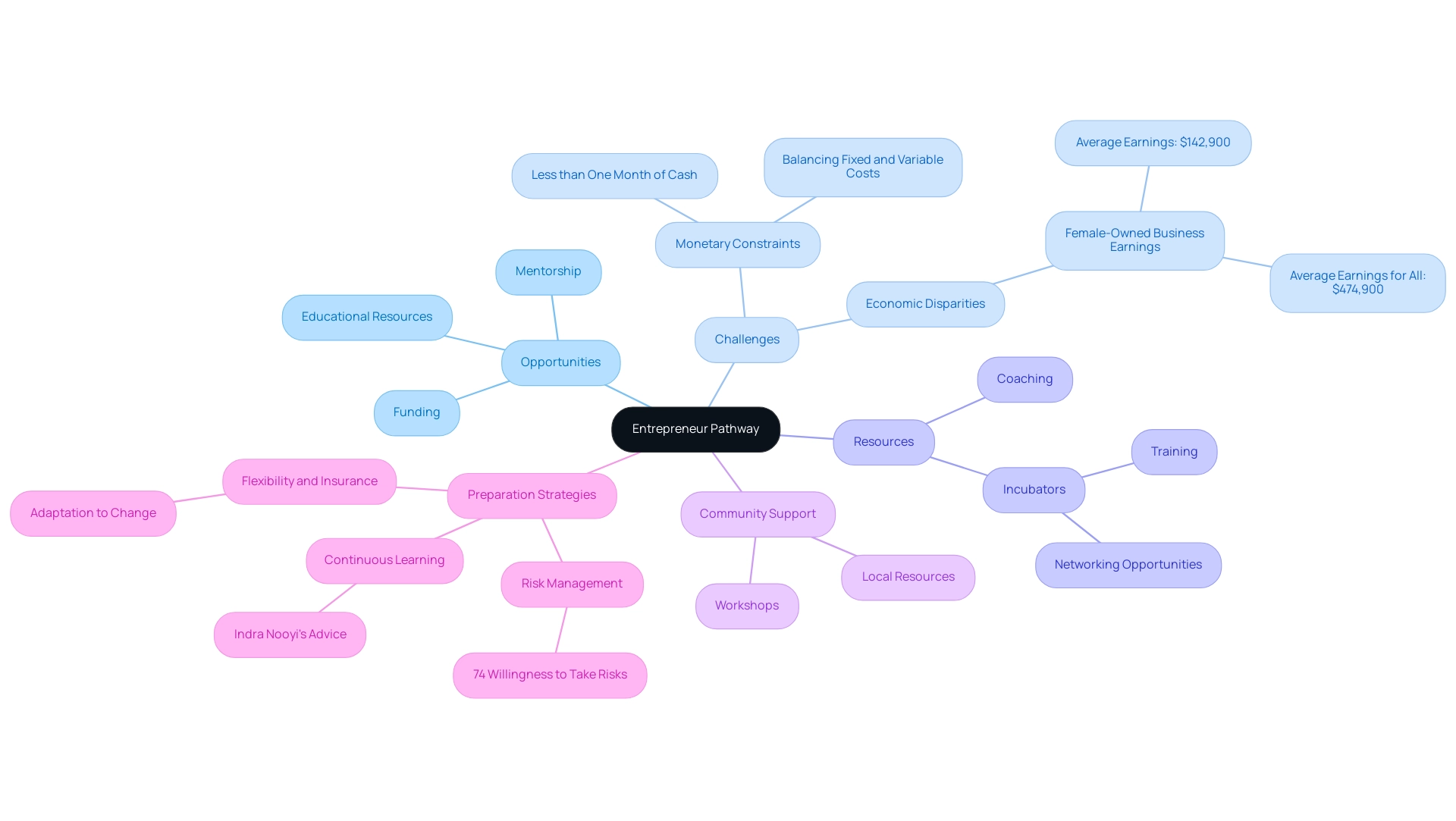
Step-by-Step Guide to Navigating the Entrepreneur Pathway
- Identify Your Venture Idea: Begin by brainstorming concepts that align with your passions and skills while addressing unmet market needs. A thorough examination of existing enterprises within your field will illuminate the competitive landscape and guide your unique value proposition.
- Conduct Market Research: Validate your concept by engaging in detailed market research. Identify your target audience, scrutinize competitors, and evaluate potential demand. Recent data indicates that effective market research can significantly enhance your startup’s chances of success, as understanding the market landscape is crucial for informed decision-making.
- Create a Venture Plan: Develop a detailed venture strategy that clearly specifies your model, marketing approach, economic projections, and operational framework. This essential document will not only serve as a roadmap for your entrepreneur pathway but is also critical for securing funding from potential investors or lenders.
- Explore Funding Options: Look into a variety of funding sources such as personal savings, loans, grants, and investors. Numerous programs are dedicated to supporting aspiring entrepreneurs, offering both financial assistance and valuable resources. Given that 74% of small to medium enterprise owners are prepared to take significant risks for success, being proactive in exploring funding can provide a solid foundation for your venture.
- Register Your Venture: Determine the appropriate structure—be it a sole proprietorship, limited liability company (LLC), etc.—and register your venture with the relevant government bodies. Ensure you acquire all necessary licenses and permits to operate legally within your jurisdiction.
- Build a Support Network: Forge connections with mentors, fellow entrepreneurs, and local enterprises. A robust support network can offer invaluable insights, encouragement, and opportunities for collaboration along the entrepreneur pathway, which are especially critical given that over 70% of small enterprises report challenges in hiring the right talent. The current labor market is tough, with employee counts down by 40%, making it crucial to attract the right team.
- Launch Your Business: With all elements in place, it’s time to launch! Focus on effectively marketing your product or service to attract customers and drive sales. Remember, the launch phase is just the beginning of your entrepreneurial journey.
- Monitor and Adapt: Post-launch, it’s essential to continuously track your performance. Be ready to pivot your strategies based on customer feedback and evolving market conditions. Regular assessments of your goals and operational strategies will be vital for ensuring your long-term success in a competitive landscape. Notably, female-owned enterprises earned an average of $142,900 in 2019 compared to $474,900 for all privately held firms, highlighting the importance of addressing gender disparities in entrepreneurship.
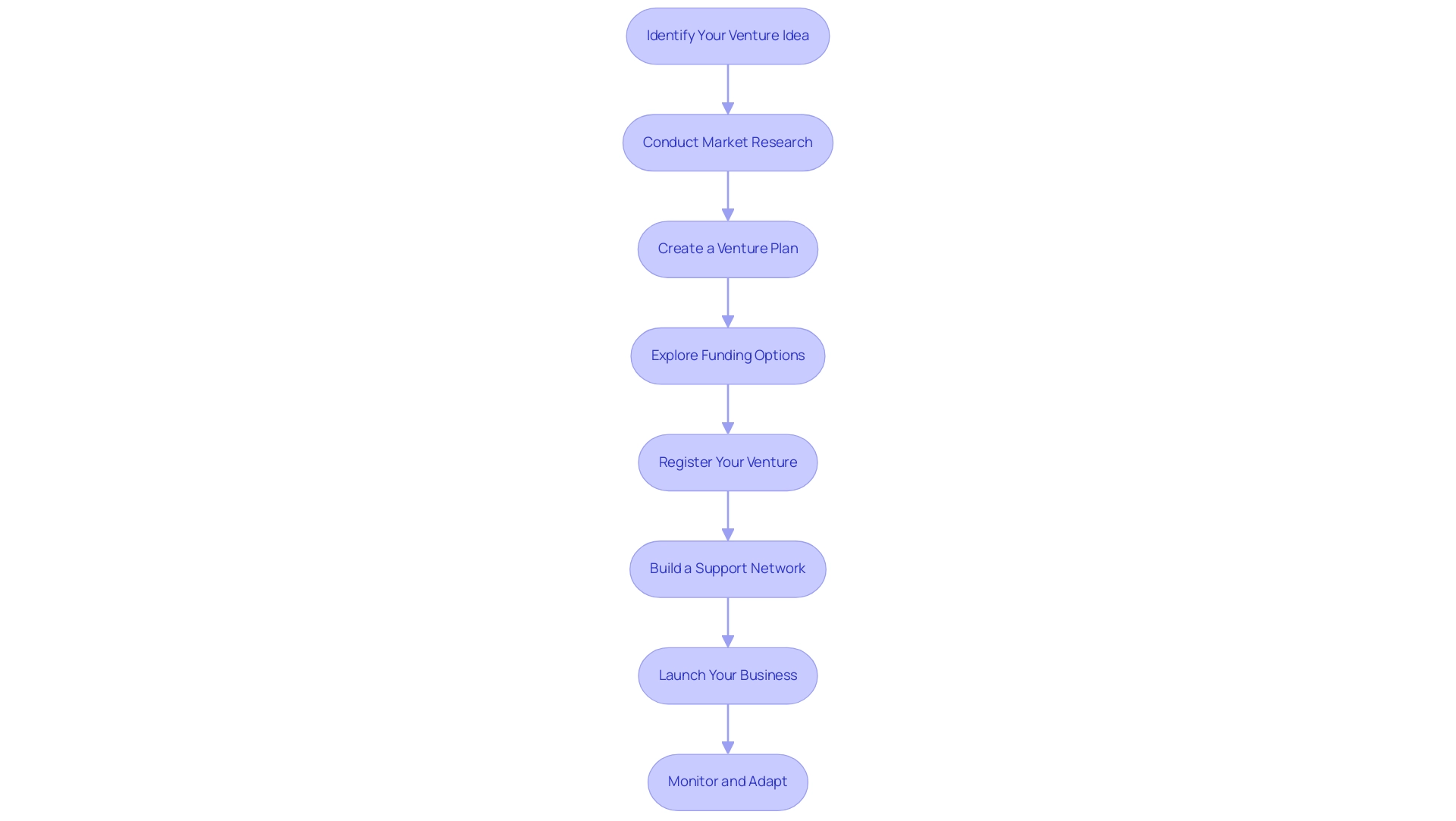
Developing Essential Skills for Entrepreneurs
To thrive as an entrepreneur, it is imperative to cultivate a diverse skill set that will support your entrepreneurial journey:
- Leadership: Develop your capacity to lead and inspire. This involves honing effective communication, mastering team management, and refining your decision-making abilities. Strong leaders not only guide their teams but also foster an environment where innovation can flourish.
- Financial Knowledge: A solid understanding of money management is essential. This includes budgeting, accounting, and cash flow management. Entrepreneurs on the entrepreneur pathway, armed with economic knowledge, can make informed choices that propel their ventures toward success. In fact, a significant 74% of small and medium enterprise owners express a willingness to take substantial risks to achieve their goals, as noted by Oxford Economics, further highlighting the need for sound financial judgment.
- Marketing and Sales: Acquaint yourself with effective marketing strategies and sales techniques to attract and retain customers. In today’s competitive landscape, the ability to create compelling campaigns can set your enterprise apart.
- Problem-Solving: Strengthening your critical thinking and problem-solving skills is vital. Entrepreneurs frequently encounter unforeseen challenges, and the ability to devise practical solutions swiftly can be the difference between success and failure.
- Networking: Invest in your networking skills to build valuable connections within your industry. Connecting with colleagues through events, professional associations, and social media platforms not only broadens your network but also creates pathways to new opportunities and collaborations.
As you begin your entrepreneur pathway in starting a company, keep in mind that the typical startup funding for small ventures is approximately $10,000, with many individuals beginning with under $25,000. This relatively low barrier to entry can be empowering, but it also underscores the importance of being financially savvy. Moreover, as the landscape continues to evolve, business owners are encouraged to adapt their strategies to meet changing customer needs, especially during crises, and to ensure they have adequate insurance coverage—a crucial element for long-term sustainability.
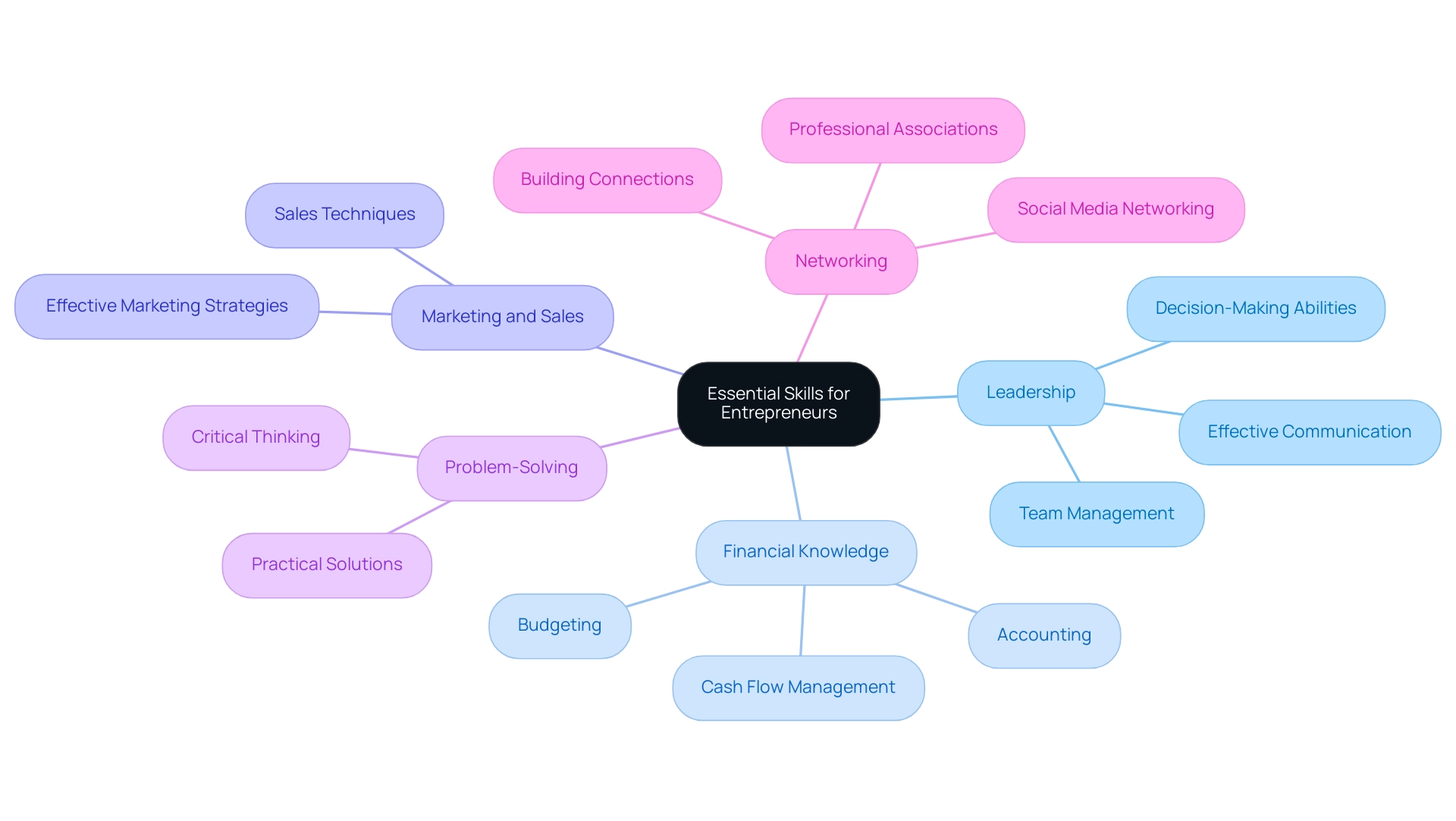
Leveraging Resources and Support Systems
As an aspiring entrepreneur on the entrepreneur pathway, it is crucial to understand the landscape of risks in commerce, especially considering that only one in ten startups in the United States survive and achieve long-term growth. Leveraging available resources and support systems can significantly increase your chances of success on the entrepreneur pathway. Here are some essential pathways to consider:
- Business Incubators and Accelerators: These programs are vital for new startups, providing mentorship, training, and the necessary resources to foster growth. They not only guide you through the early stages of enterprise development but also create networking opportunities and facilitate access to crucial funding sources. Research indicates that startups participating in these programs have markedly higher success rates than those that do not.
- Local Small Business Administration (SBA) Offices: The SBA is a treasure trove of resources that assist with planning, financing, and regulatory compliance. They provide various funding options customized for small enterprises, including grants, loans, and guidance on self-funding through checking and savings accounts as well as cash equivalents like money market accounts and certificates of deposit. Tapping into the SBA’s resources can be a game changer for your entrepreneur pathway, connecting you with local business mentors who can share invaluable insights and experiences.
- Online Courses and Workshops: A wealth of online platforms offers courses on entrepreneurship, marketing, finance, and other essential skills. These flexible learning options allow you to acquire knowledge at your own pace, ensuring you are well-prepared to tackle the complexities of running a business.
- Networking Events: Actively participating in local networking events, workshops, and seminars can open doors to meet other entrepreneurs and potential investors. Cultivating relationships within these circles can lead to valuable collaborations and opportunities that might otherwise remain undiscovered.
- Mentorship Programs: Engaging with mentorship programs that connect you with experienced entrepreneurs can provide critical guidance and support on your entrepreneur pathway. Mentors can offer insights based on their own journeys, helping you navigate challenges and avoid common pitfalls.
Valentina Assenova emphasizes the importance of aligning program designs with growth goals, stating,
Therefore, founders should carefully consider how different program designs align with their goals for growth and expansion.
Moreover, it’s crucial to recognize that particular sectors, like construction, encounter substantial obstacles, with 20% of startups failing within the first year and two out of three closing down within ten years. However, leveraging the right resources can significantly enhance your chances of success.
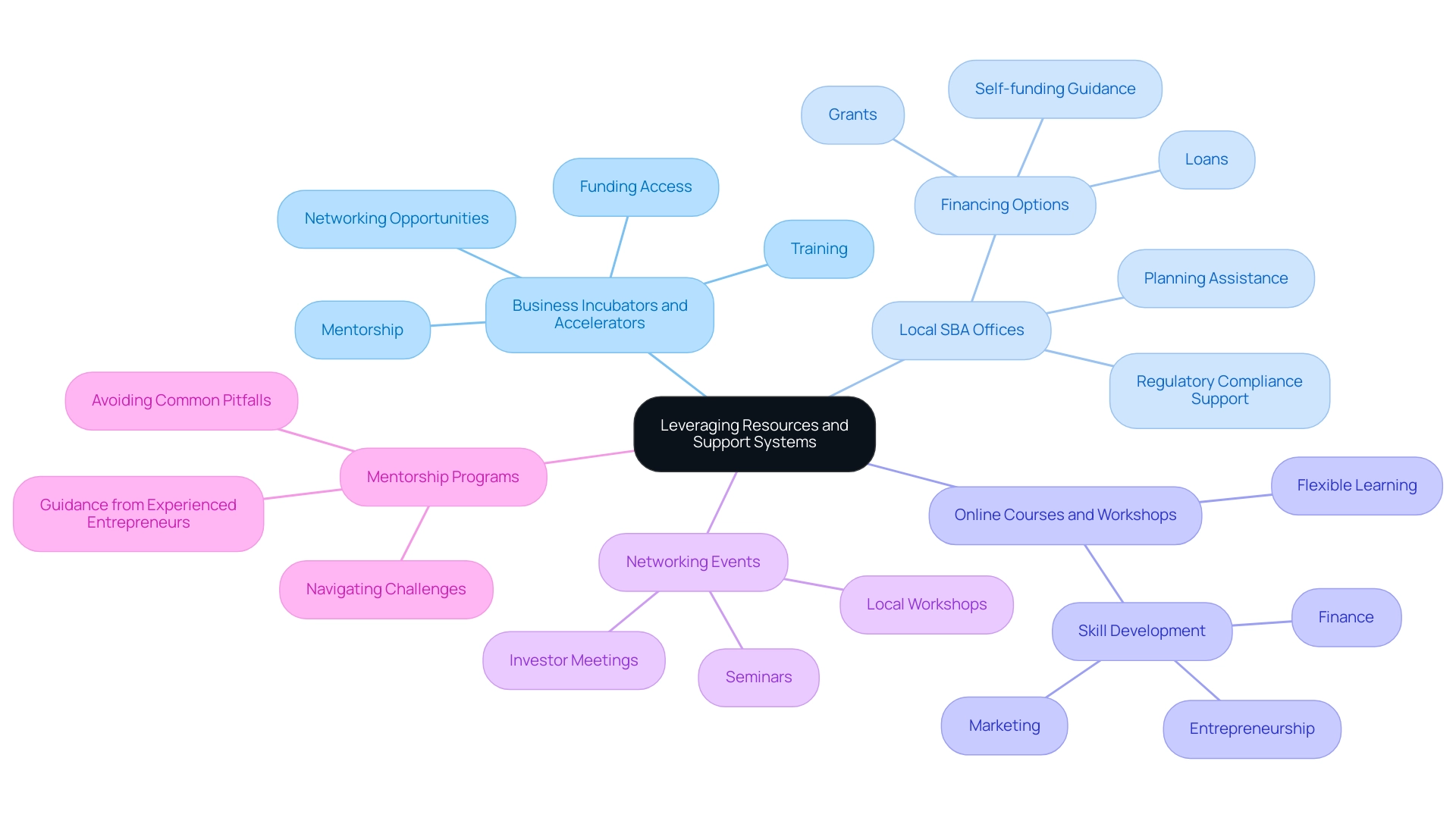
Creating a Business Launch Timeline
Creating a launch timeline is a crucial step in the entrepreneur pathway for aspiring entrepreneurs, as it helps break down the overwhelming process into manageable phases. Here’s a structured guide to navigate your journey:
-
Pre-Launch (3-6 months prior): Begin by finalizing your entrepreneurial concept and conducting thorough market research.
Create a thorough plan that outlines your vision and strategy. This phase is also vital for networking along the entrepreneur pathway—cultivating relationships can open doors to essential resources and support. Addressing cash flow early on is critical, as highlighted in the case study ‘Cash Flow Issues in Company Failures,’ which illustrates how poor cash flow management can lead to organizational failure.
-
Funding and Registration (2-3 months prior): Secure the necessary funding to fuel your venture. This could involve seeking investors, applying for loans, or utilizing personal savings. According to John Doe from the NSBA, one of the biggest challenges to the survival of small enterprises and startups is the cost of health insurance.
This emphasizes the importance of addressing financial challenges early in the entrepreneur pathway. Additionally, ensure you complete all legal requirements, including registration and obtaining permits, to establish your venture legally.
-
Marketing and Branding (1-2 months prior): This phase focuses on developing a robust marketing strategy and creating branding materials that resonate with your target audience.
Establish your online presence through a professional website and active social media channels, which are crucial for engaging potential customers. Effective marketing strategies can also help generate early revenue on the entrepreneur pathway, contributing to positive cash flow.
-
Soft Launch (1 month prior): Conduct a soft launch by introducing your product or service to a select audience.
This trial run enables you to collect valuable feedback, which is crucial for making any necessary adjustments before the official launch. Monitoring cash flow during this phase is vital to ensure that any adjustments made do not negatively impact your finances.
-
Official Launch: Set a definitive date for your grand opening.
Execute your marketing plan with precision to ensure your target audience is aware of your launch. As you monitor performance, remain agile—adapt your strategies based on the response you receive. A well-timed launch can significantly affect your cash flow, impacting your business’s sustainability on the entrepreneur pathway. In 2023, a staggering 82% of businesses failed due to cash flow issues, emphasizing the importance of a strategic approach during your launch.
Therefore, it’s essential to address financial planning early on to enhance your chances of success.
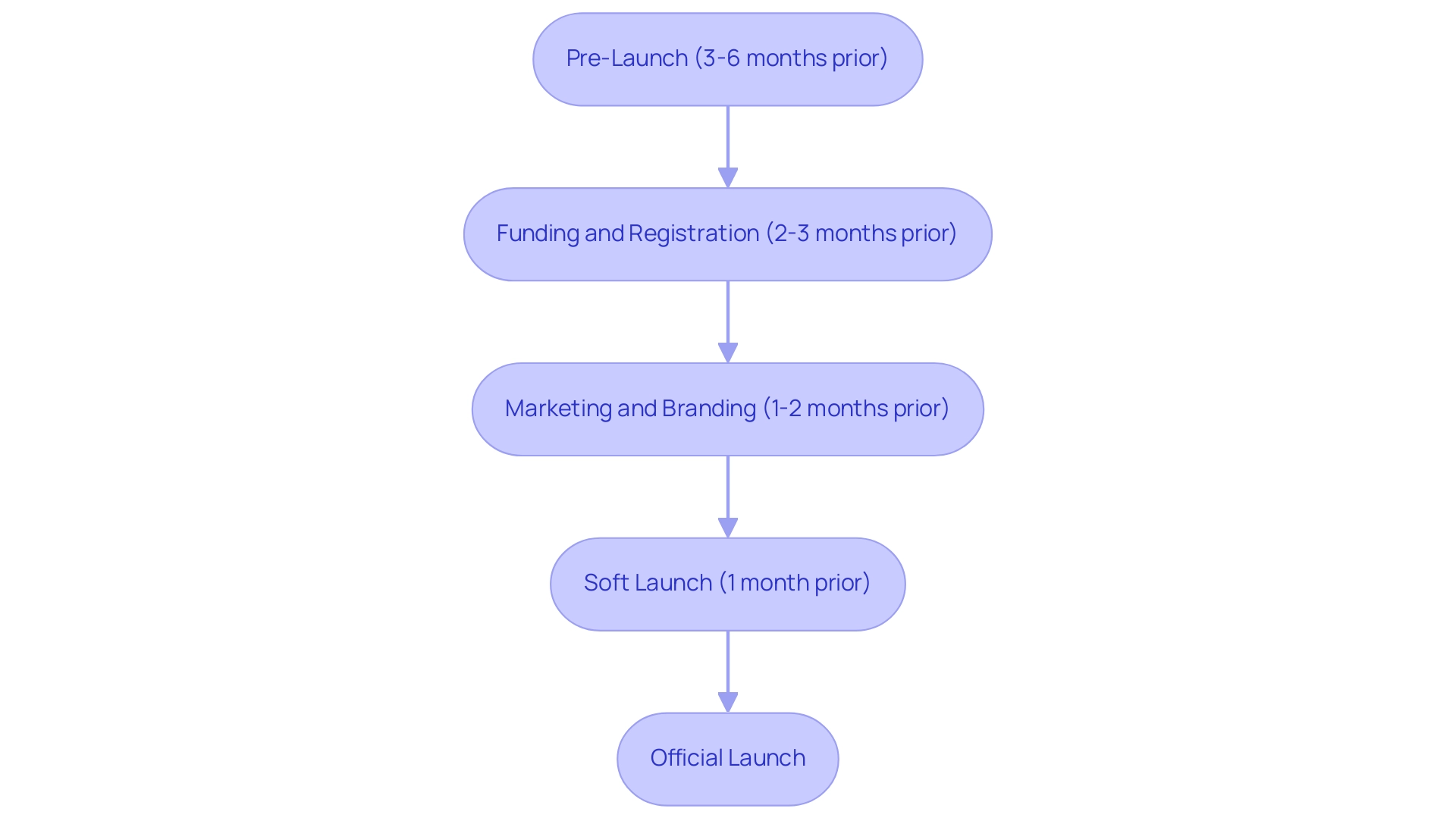
Conclusion
The Entrepreneur Pathway provides a vital framework for aspiring business owners, equipping them with the tools and resources necessary to navigate the complexities of launching and sustaining a business. By understanding the importance of financial planning, mentorship, and strategic networking, entrepreneurs can significantly enhance their chances of success. Each step, from identifying a business idea to creating a comprehensive launch timeline, contributes to building a strong foundation for future growth.
Developing essential skills in leadership, financial literacy, and marketing is crucial for thriving in a competitive landscape. Entrepreneurs must remain adaptable and open to learning, leveraging available resources such as:
- business incubators
- local SBA offices
- mentorship programs
to support their journey. The insights garnered from market research and peer connections can illuminate the path to success, while the ability to monitor and adjust strategies post-launch will ensure long-term viability.
Ultimately, the Entrepreneur Pathway emphasizes that success is not merely a destination but a continuous journey of learning, adaptation, and resilience. By embracing the challenges and opportunities inherent in entrepreneurship, aspiring business owners can foster innovation, promote equity, and contribute positively to their communities. As they embark on this exciting venture, the commitment to strategic planning and leveraging available resources will be key to realizing their entrepreneurial dreams.
Frequently Asked Questions
What is the Entrepreneur Pathway?
The Entrepreneur Pathway is a structured framework designed for individuals aspiring to launch their own businesses, offering access to funding, mentorship programs, and educational resources.
How does coaching benefit entrepreneurs?
Coaching helps entrepreneurs clarify their goals and overcome challenges by identifying blind spots and breaking problematic patterns that may hinder their progress.
What role do incubators play in the entrepreneurial journey?
Incubators provide essential training, networking opportunities, and support for refining business ideas, which are crucial for new startups.
What financial challenges do aspiring entrepreneurs face?
Many entrepreneurs face monetary challenges, such as having less than one month of cash available, emphasizing the need for careful fiscal planning and budgeting.
What should new founders understand about their initial earnings?
New founders should be aware that initial earnings may be modest, but can increase with performance as the business grows.
What disparities exist in earnings among different types of enterprises?
In 2019, female-owned enterprises earned an average of $142,900, while all privately held companies averaged $474,900, highlighting the need for equitable funding strategies.
Why is flexibility important for startups?
Startups must remain flexible, especially during crises, to adapt and ensure they are protected with appropriate insurance.
What percentage of small and medium enterprise owners are willing to take risks for success?
A staggering 74% of small and medium enterprise owners express a willingness to take significant risks for success.
What resources are available for aspiring entrepreneurs?
Communities offer local resources and workshops designed to foster entrepreneurship, which can be crucial for those on the entrepreneur pathway.
What skills are essential for entrepreneurs?
Essential skills include leadership, financial knowledge, marketing and sales, problem-solving, and networking.
What is the typical startup funding for small ventures?
The typical startup funding for small ventures is approximately $10,000, with many individuals starting with under $25,000.
How can business incubators and accelerators help startups?
These programs provide mentorship, training, and resources that significantly enhance startups’ chances of success compared to those that do not participate.
What role does the Small Business Administration (SBA) play for entrepreneurs?
The SBA offers resources for planning, financing, and regulatory compliance, including funding options like grants and loans tailored for small enterprises.
Why is creating a launch timeline important for entrepreneurs?
A launch timeline helps break down the overwhelming process into manageable phases, ensuring that all critical steps are addressed before launching a business.
What should entrepreneurs focus on during the marketing and branding phase?
Entrepreneurs should develop a marketing strategy, create branding materials, and establish an online presence to engage potential customers effectively.


